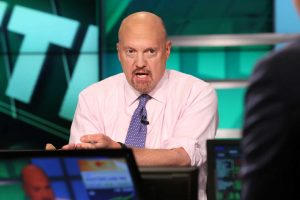'What an opportunity to buy things' — Cramer likes stocks tied to strong American consumer

- CNBC's Jim Cramer said Friday the recent market underperformance of non-tech stocks gives investors the chance to purchase beaten-up names.
- "The American consumer is amazingly strong," he said. "I think travel is good. I think retail is great."
- Cramer said concerns about rising Covid cases in Europe won't lead to a slowdown in the U.S. economy.
CNBC's Jim Cramer said Friday the recent market underperformance of non-tech stocks gives investors the chance to purchase names that do well when Americans spend their money.
"What an opportunity to buy things that are being thrown away left and right," Cramer said on "Squawk on the Street," as Dow futures pointed to an over 200-point decline as Austria announced a fourth national lockdown starting Monday. "I think travel is good. I think retail is great."
"We're oversold. The Dow has been down for a long time. Technology can't always lead us," Cramer said, shortly before tech-stock strength at the open initially pared losses in the S&P 500 and the 30-stock average. The Nasdaq carried over its modest gains from the premarket. Later in the session, the Dow's drop gained steam.
Concerns about rising Covid cases in Europe won't lead to a slowdown in the U.S. economy, Cramer said. "I think you pounce on it. Maybe we get more bad news in Europe over the weekend so you pounce some today and then some next week."
The "Mad Money" host said he likes travel and retail stocks. "The American consumer is amazingly strong. Anything related to the American consumer — whether its travel, whether it's the spending at the mall — is just a fantastic opportunity."
Airline stocks were getting slammed on European Covid worries, with United leading the sector lower with a roughly 4% decline Friday. Cruise and hotel stocks were also weaker.
Shares of Walmart and Target were bouncing modestly Friday after being hit earlier this week. Strong quarterly results from the retailers were overshadowed by concerns about margins because they largely absorbed higher costs related to supply chain disruptions and labor shortages rather than passing them along to their customers.
Source: Read Full Article
